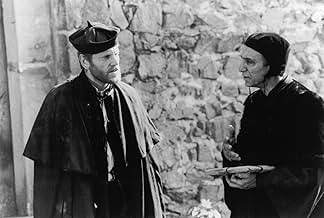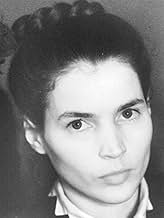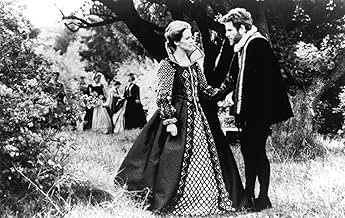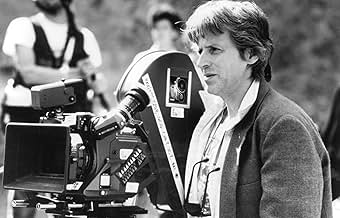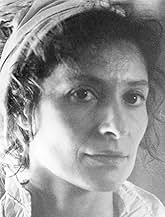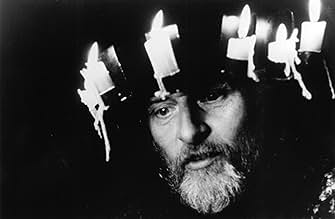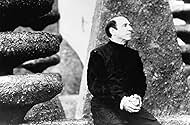IMDb RATING
5.8/10
3.3K
YOUR RATING
Nostradamus (1503-66) was a French doctor, astrologer and seer during the Inquisition, successful in treating patients during an outbreak of plague.Nostradamus (1503-66) was a French doctor, astrologer and seer during the Inquisition, successful in treating patients during an outbreak of plague.Nostradamus (1503-66) was a French doctor, astrologer and seer during the Inquisition, successful in treating patients during an outbreak of plague.
- Director
- Writers
- Stars
Maia Morgenstern
- Helen
- (as Maja Morgenstern)
Oana Pellea
- Landlady
- (as Oana Pelea)
- Director
- Writers
- All cast & crew
- Production, box office & more at IMDbPro
Featured reviews
Michel de Nostredame, generally known as Nostradamus, was a sixteenth-century French physician, but is better known today as a reputed prophet and seer. His fame rests on a series of gnomic quatrains which, it has been claimed, contain predictions of future world events, including wars, political changes and natural disasters. The problem is that his quatrains are written in a language so obscure that they can be interpreted to mean virtually anything. Those who seek to interpret them generally do so with the benefit of hindsight, seeking to prove that Nostradamus predicted World War II, the atomic bomb, 9/11 or whatever; those seeking to use his works to foretell events which have not yet happened tend to come badly unstuck. Even when a particular quatrain can be "proven" to have predicted a particular event, this is normally done with the help of some creative rewriting or creative mistranslating of his words. (Anyone with any knowledge of the French of the period can find some spectacular examples of this on the internet, particularly those interpretations which try to prove that by "Hister"- a Classical name for the River Danube- Nostradamus meant "Hitler").
The obscurity of Nostradamus' prophecies was quite deliberate; had he clearly and unambiguously foretold specific events which then failed to occur, his reputation as a seer would have been destroyed for ever. The film, however, would have us believe that he deliberately obscured his meaning in order to ward off the attentions of the Church, although in the sixteenth century attempts to foretell the future were not forbidden and, indeed, astrology was regarded as an intellectually respectable, and theologically permissible, science.
As might be clear from my opening paragraph, I personally do not believe that Nostradamus possessed a supernatural power to foretell the future. (Indeed, I do not believe that any human being possesses or has possessed such a power). In the original French, his verses have a certain surrealist inventiveness, but I have never seen any reason to attribute any other significance to them. This film, however, is quite openly made on the assumption that its hero did indeed possess prophetic gifts; I was left with the definite feeling that Roger Christian was asking me to accept that Nostradamus really was a man tormented by horrifying visions of the future and whose prophecies were intended as warnings to mankind of the fate that awaited them.
Now I normally leave my scepticism about the supernatural at the cinema door; I have never, for example, allowed the fact that I do not believe in witchcraft to prevent me from enjoying the Harry Potter films. Suspension of disbelief, however, is something I find easier to accomplish in the context of a wholly fictional story than in the context of a biography of a real individual. Neither J K Rowling nor the makers of the "Potter" films are, after all, asking me to accept that witchcraft has any existence outside the realm of fiction, but when a film-maker asks me to give credence to the writings of a sixteenth-century charlatan I find it difficult to take his film seriously.
"Nostradamus" has other weaknesses, quite apart from its flawed central premise. Unlike many period dramas, this one is not particularly visually attractive, with dull, muddy colours. The action is slow-moving and at times difficult to follow. I understand that Tchéky Karyo is a well-known and respected actor in France, indeed the winner of a Cesar Award, so I presume that he can act in his own language far better than he can in English. (I have never seen any of his French-language movies apart from "Le Retour de Martin Guerre", in which he only had a small part). In the leading role here he is absolutely horrible, dull and wooden without any convincing attempt to convey emotions. Some of the supporting cast are better, including Julia Ormond as Nostradamus' wife, although I was left with the feeling that F. Murray Abraham had come down a long way since "Amadeus" and Rutger Hauer equally far since "Blade Runner". This was the first of Roger Christian's films I have seen, and I cannot say that it has inspired me with any great desire to explore his work further. 4/10
The obscurity of Nostradamus' prophecies was quite deliberate; had he clearly and unambiguously foretold specific events which then failed to occur, his reputation as a seer would have been destroyed for ever. The film, however, would have us believe that he deliberately obscured his meaning in order to ward off the attentions of the Church, although in the sixteenth century attempts to foretell the future were not forbidden and, indeed, astrology was regarded as an intellectually respectable, and theologically permissible, science.
As might be clear from my opening paragraph, I personally do not believe that Nostradamus possessed a supernatural power to foretell the future. (Indeed, I do not believe that any human being possesses or has possessed such a power). In the original French, his verses have a certain surrealist inventiveness, but I have never seen any reason to attribute any other significance to them. This film, however, is quite openly made on the assumption that its hero did indeed possess prophetic gifts; I was left with the definite feeling that Roger Christian was asking me to accept that Nostradamus really was a man tormented by horrifying visions of the future and whose prophecies were intended as warnings to mankind of the fate that awaited them.
Now I normally leave my scepticism about the supernatural at the cinema door; I have never, for example, allowed the fact that I do not believe in witchcraft to prevent me from enjoying the Harry Potter films. Suspension of disbelief, however, is something I find easier to accomplish in the context of a wholly fictional story than in the context of a biography of a real individual. Neither J K Rowling nor the makers of the "Potter" films are, after all, asking me to accept that witchcraft has any existence outside the realm of fiction, but when a film-maker asks me to give credence to the writings of a sixteenth-century charlatan I find it difficult to take his film seriously.
"Nostradamus" has other weaknesses, quite apart from its flawed central premise. Unlike many period dramas, this one is not particularly visually attractive, with dull, muddy colours. The action is slow-moving and at times difficult to follow. I understand that Tchéky Karyo is a well-known and respected actor in France, indeed the winner of a Cesar Award, so I presume that he can act in his own language far better than he can in English. (I have never seen any of his French-language movies apart from "Le Retour de Martin Guerre", in which he only had a small part). In the leading role here he is absolutely horrible, dull and wooden without any convincing attempt to convey emotions. Some of the supporting cast are better, including Julia Ormond as Nostradamus' wife, although I was left with the feeling that F. Murray Abraham had come down a long way since "Amadeus" and Rutger Hauer equally far since "Blade Runner". This was the first of Roger Christian's films I have seen, and I cannot say that it has inspired me with any great desire to explore his work further. 4/10
I must say I enjoyed this film, but I agree with the other comments that it was horribly disjointed. It was absolutely gorgeous to look at (I would rate it up there with Elizabeth or Rozencranz & Guildenstern are Dead in that respect), but it is pretty hard to follow. Having read a short bio on Nostradamus recently, it seems that they got their facts right (there was some speculation, but isn't there always in such films?), but it seems rushed, like the director is trying to fit too much into the time alloted. Overall an enjoyable picture.
Tcheky Karyo, most familiar to American audiences as Bob, the enigmatic secret agent by way of Pygmalion in Luc Besson's NIKITA, has his first English-language lead role as the 16th-century physician and prophet Michel de Nostradame, who predicted various events occurring hundreds of years into the future.
Filmed in Romania, the film is a grim, grubby depiction of the renaissance era, but seldom reaches any moments of true insight into Nostradamus' life. Instead of taking a scholarly approach required of the subject, and concentrating on the man's vision, director Roger Christian (whose claim to fame is being the art director on Ridley ScottÕs ALIEN and directing the pretty much forgetable horror flick THE SENDER) panders to the lowest common denominator by focusing on his love life, and his run-ins with pugnacious Inquisitors.
When he is shown having his prophetic visions, most of the sequences are stilted and hokey. Only one prediction sequence has any power, the vision of the Black Rain, filmed in Copsa Mica, which the National Geographic Society once branded as the most polluted city in Europe.
Academy Award Winner F. Murray Abraham (AMADEUS), called in to save the acting day, does serviceable work as Scalinger, Nostradamus' sometime mentor, and Rutger Hauer is weird and funny as the Mystic Monk. Do I hear laughs? His turn is actually quite enjoyable, with his candle-lit hat and his demolition of the loathsome flagellates.
Karyo consorts with a bevy of bold European actresses, including Julia Ormond, Maia Morgenstern (THE OAK), and Assumpta Serna (MATADOR, THE FENCING MASTER.) He makes a noble effort with his calm, cultivated, at times endearing performance but he can't carry the whole film.
The movie eventually dissipates in the scarcity of its low budget, borrowing footage (ironically enough) from ALIENS for its final sequence which depicts space travel.
Filmed in Romania, the film is a grim, grubby depiction of the renaissance era, but seldom reaches any moments of true insight into Nostradamus' life. Instead of taking a scholarly approach required of the subject, and concentrating on the man's vision, director Roger Christian (whose claim to fame is being the art director on Ridley ScottÕs ALIEN and directing the pretty much forgetable horror flick THE SENDER) panders to the lowest common denominator by focusing on his love life, and his run-ins with pugnacious Inquisitors.
When he is shown having his prophetic visions, most of the sequences are stilted and hokey. Only one prediction sequence has any power, the vision of the Black Rain, filmed in Copsa Mica, which the National Geographic Society once branded as the most polluted city in Europe.
Academy Award Winner F. Murray Abraham (AMADEUS), called in to save the acting day, does serviceable work as Scalinger, Nostradamus' sometime mentor, and Rutger Hauer is weird and funny as the Mystic Monk. Do I hear laughs? His turn is actually quite enjoyable, with his candle-lit hat and his demolition of the loathsome flagellates.
Karyo consorts with a bevy of bold European actresses, including Julia Ormond, Maia Morgenstern (THE OAK), and Assumpta Serna (MATADOR, THE FENCING MASTER.) He makes a noble effort with his calm, cultivated, at times endearing performance but he can't carry the whole film.
The movie eventually dissipates in the scarcity of its low budget, borrowing footage (ironically enough) from ALIENS for its final sequence which depicts space travel.
I watched this movie in 1998 and would like to know whether this movie told exactly about his life. Although i never read the prophecy of Nostradamus but i am amazed that he can know that there will be three world war. The fact is there were two already and the third one, we still can't judge it by ourselves. What i have to say is an excellent movie with huge casts and it has been narrated carefully by the writer and producer. Why not a remake? Will that be better?
10Dejael
NOSTRADAMUS, aka: Michel de Notre Dame (1503-1566) is an enigmatic, elusive character in history books and dusty old biographies. What this excellent biopic does is make him a real flesh-and-blood person with passions, desires, fears and dreams, and the extremely talented European actor Tcheky Karyo (The CORE, 2002) carries the film admirably from start to finish. He makes Nostradamus a living, breathing human being, a Christian Jew who is seeking to understand his place in the Universe and is an open-minded seeker of truth and a true scientist and physician, a dedicated man of science who invented the first chewable Vitamin C tablet made with rose hips as an effective cure for the Black Plague in its early stages. Of course there was no cure once the plague had spread in the body, so it must have been especially a cruel twist of fate for Michel when his dear first wife Marie and their two children died of the plague and he could not even save them! The casting, acting, production, story and script, and lush cinematography at fascinating locations (filmed in Romania and Europe in 1993) are all first-rate. All aspects of this production are extremely well-handled. Especially good are flawless performances by Julia Ormond, Assumpta Serna, Amanda Plummer, Rutger Hauer, Anthony Higgins, and F. Murray Abraham as the remarkable Dr. Julius Caesar Scalinger (1484-1558), a wealthy friend of both Nostradamus and Dr. Rabelais of Paris, the most noted physician of his day in Europe. The visual effects are a bit shaky here and there, but in all everything works well to a satisfying look into the life of one of the greatest mystery men of the early Renaissance. His prophecies are fascinating and penetrating, as a latter-day prophet. One thing I would love to know is where that beautiful mansion of Dr. Scalinger is, and more about it. If it was built during the life of Nostradamus, it certainly was one of the most modern structures in the world, in its day! An interesting site, with its ornate topiary garden.
The music score by Barrington Pheloung is captivating and should be available on CD. This film deserves a wide-screen DVD release! Classic epic drama, although episodic, with true European realism in its depiction of vignettes from Michel's love life, showing us the world as it really was in the plague-ridden Roman Catholic-dominated 16th Century Europe. Highly recommended, worth several viewings to take all of it in.
The music score by Barrington Pheloung is captivating and should be available on CD. This film deserves a wide-screen DVD release! Classic epic drama, although episodic, with true European realism in its depiction of vignettes from Michel's love life, showing us the world as it really was in the plague-ridden Roman Catholic-dominated 16th Century Europe. Highly recommended, worth several viewings to take all of it in.
Did you know
- TriviaRutger Hauer and F. Murray Abraham appeared in Surviving the Game (1994).
- GoofsNostradamus is showing his son how to use a divining rod to find underground water and says that there is water 4 meters below, but the metric system wasn't invented until 1799 (roughly 160 years later).
- Quotes
The Mystic Monk: Light the candle at the bottom of your heart.
- How long is Nostradamus?Powered by Alexa
Details
Box office
- Budget
- DEM 20,000,000 (estimated)
- Gross US & Canada
- $364,164
- Opening weekend US & Canada
- $27,312
- Sep 18, 1994
- Gross worldwide
- $364,164
Contribute to this page
Suggest an edit or add missing content


